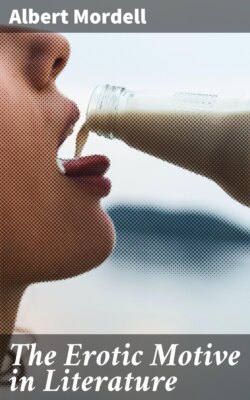Читать книгу The Erotic Motive in Literature - Albert Mordell - Страница 11
На сайте Литреса книга снята с продажи.
III
ОглавлениеTable of Contents
A comprehension of the erotic in ourselves will help us discern many false ideals connected with the treatment of love in literature. I refer especially to the ideal of a first and only love (regarded by the lover usually as Platonic) which has been spread by deceptive authors and which has produced much affectation and insincerity in literature.
In real life people do not generally marry their first loves; they often cherish contempt for persons once loved; they do not as a rule go through life always claiming that they loved once and that they would never love again. On the contrary, they usually marry and settle down and forget about their early affairs, although in most cases these have lasting influence.
If poets, however, were to speak in a prosaic manner of their early loves, their works would be less admired. The public loves loyalty and hence it encourages love literature that is over-sentimental and false. No doubt when a man contracts an unhappy marriage or does not succeed in winning love later in life he looks back upon an early love affair with tenderness. And while it is true that the past always rules us we are often satisfied as to the manner in which it shaped our futures. Robert Browning had an early sad love affair which influenced his Pauline and indeed many of his later lyrics, but he was happy in the love of the poetess Elizabeth Barrett. Mark Twain's married life was ideal and happy, in spite of an early love affair of his which ended because of the accidental non-delivery of a letter. On the other hand Byron, who was unhappily married, cherished the love of his early sweetheart Mary Chaworth for over twenty years. Strangely and unjustly enough he has been accused of insincerity and posing, and most critics refuse to admit that many of his later love poems were written to her.
There are two conspicuous instances in literature where a poet's love was thought by himself to have lasted for life, the cases of Dante and Petrarch. If the loves of these Italians for their mistresses are strictly investigated, I think it will be discovered that they have hoodwinked the world about their loves. They wrote their best poems about their beloved ones, after these had died, and death often makes a man unwittingly write falsely about the past. Pfister tells us in his Psychoanalytic Method of a diseased man of fifty who lived apart from his wife in the same house, and who treated her brutally. After her death he always insisted that they were an ideal couple. Pfister relates another story of a widower who recalled only the happy part of his unhappy married life, and thought he never could marry again.
There has always been a suspicion among some people about the durability of the love felt by Dante and Petrarch, for Beatrice and Laura respectively. Symonds says of Laura: "Though we believe in the reality of Laura, we derive no clear conception either of her person or her character. She is not so much a woman as woman in the abstract. … The Canzoniere is therefore one long melodious monotony poured from the poet's soul, with the indefinite form of a beautiful woman seated in a lovely landscape." (Encyclopædia Britannica, Vol. XXI, P. 314.)
Petrarch was twenty-three years old in 1327 when he met Laura. She died twenty-one years later. Petrarch survived her twenty-six years, dying in 1374. Petrarch, it should be mentioned, had two illegitimate children born by a mistress before Laura's death; they were later legitimised. The poet probably at times felt the pangs of disprised love to the extent that he claims he did in his sonnets; he may have experienced the grief he describes he suffered in his sonnets. But that he was in the constant throes of love for her for forty-seven years is doubtful. He probably was projecting that ideal of faithful love to please the public; he offered himself as the type of hero the public likes; a faithful, steadfast lover. It was this kind of ideal that made so great a genius like Thomas Hardy gratify the public taste by portraying so unswerving a lover as Gabriel Oak in Far From the Madding Crowd.
The case of Dante is an even more noteworthy example of literary affectation and self-delusion. His love is the most astonishing in history. He and Beatrice were each only nine years old when he saw her. He probably saw her once after that. She died in 1290, when the poet was twenty-five years old. Great as Dante's sorrow was, it did not prevent him from marrying two years later. Dante makes Beatrice the heroine of his Divine Comedy, or at least of the Paradiso. His platonic affection for her is so unnatural that one feels he was doing what Petrarch did, unconsciously creating an ideal and depicting as permanent an emotion, that had really brief sway.
Although it is true that their past love affairs may have ruled them for life, neither Dante nor Petrarch were the faithful lovers they would have us believe they were.
